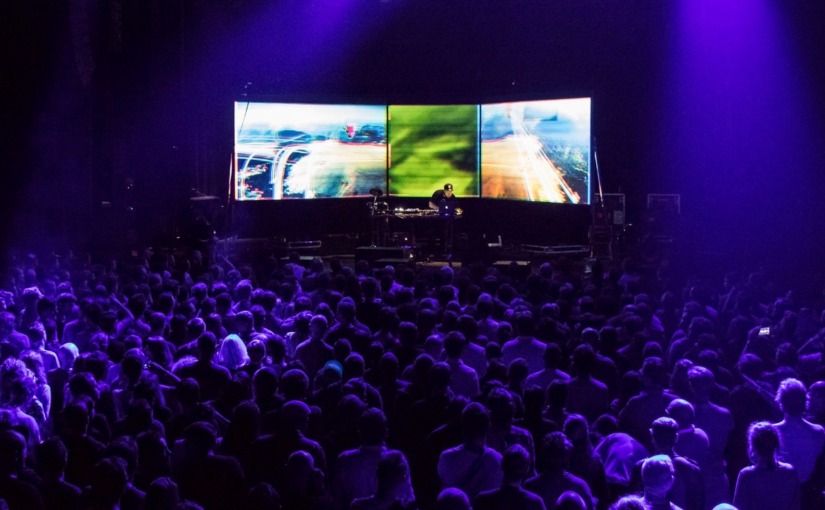The Festival Des Libertés kicked off Friday October, 20th with a sold out performance by the acclaimed Bosnian musician and two time Palme d’Or winner Emir Kusturica. The festival is organised by Bruxelles Laique whose mission statement demands the state provides citizens with equality, solidarity and emancipation, and that’s what makes Mr. Kusturica’s inclusion as headliner all the more perplexing. While Kusturica is respected the world over for his art, in his home city of Sarajevo he has become persona non grata. It stems largely from his open defence of Serbia during the Bosnian war in the early 90s, and his reluctance to condemn what the US and EU have deemed a genocide.
Kusturica has pleaded for nuance, accusing Bosnian muslims for the dissolution of the multi-ethnic society that was the former yugoslavia, but his actions in his home country have come under intense scrutiny in the last couple years. Most notably in the town of Visegrad, a site of vicious atrocity in the early 90s. The town became famous for a genocidal ethnic cleansing by the Yugoslav national army and paramilitaries led by Milan Lukic and Arkan, the former serving a life sentence in The Hague for his actions, the latter having been assassinated in the early 2000s. Visegrad was also the site of the Vilina Vlas rape camp, where hundreds of Bosnian women, some as young as 13, were raped by Yugoslav soldiers. The hotel is now state owned.
The atrocities in Visegrad, a small town on the Serbian border, have since been overshadowed by Srebrenica and Tuzla, and the governments of Serbia and the semi-autonomous region of Republika Srpska have been quick to cover up this lesser known site of genocide. Their actions have drawn the ire of many, and this is where Kusturica comes in. Emir Kusturica has, with the government of the Republika Srpska financed, designed, and promoted the building of a monument that he calls an ‘ethno-town’ named Andricgrad at the heart of where these atrocities took place. In 2011, he told the guardian that he was "...putting into this village all the money I made from films and music”.
The monument is an homage to Nobel prize winning writer Ivo Andric, whose magnum opus chronicles the bloody history of this town. Andricgrad features two mosaics, one dedicated to Gavrilo Princip, the Serbian nationalist attributed with assassinating Franz Ferdinand, the other with Kusturica, Republika Srpska president Milorad Dodik, and others pulling a rope. The painting signifies the struggle it took to build the monument according to tour guides.
President Dodik was sanctioned in January of 2017 for violating the Dayton accords, and his government has been cautioned by the international community for trying to officially open sealed records in order to reduce the body counts at famous sites of atrocity. In an act of surreal cruelty the institute set up in Visegrad by Kusturica states that its main aim is to fight historical negationism. Kusturica has been given an honorary doctorate by the institute he created, the 50 some odd employees of Andricgrad lovingly refer to him as Dr. Kusturica.
At the end of the peninsular ethno-town lies a Serbian orthodox church, replete with crosses and flags, the irony being that Ivo Andric was an atheist and ethnically Croatian. The monument was christened on June 28th, 2014, a reference to the ancient Battle of Nemanja and Slobodan Milosevic’s infamous Gazimestan speech, which has since become famous for Milosevic prescient claim of possible “armed battles”.
The absence of any reference to what happened 20 years ago is eery. This is made even more complicated because of an ongoing legal dispute that claims that the monument was built on the site of a sports complex used as a detention center, and that Kusturica did not have the right to appropriate the land. While Kusturica and the government of the Republika Srpksa have brushed off claims that they have been untowards in any way, the recent uncovering of new mass graves, as well as the government sanctioned removal of the word ‘genocide’ from the monument in the local muslim cemetery has signalled an intention to reframe the past.
Kusturica has been the key to this re-writing, he has made himself the face of this movement, he has invested heavily in this ostensible monument, and he has denied wrongdoing on the part of the Serbs, but had no similar resignation in pointing out the crimes of the Croatian fascist Ustasa during the second world war. While the governments involved in this revision have been reprimanded for their negationist attitudes, it seems easier to forgive Kusturica for his apologist views.
The organizers of the Festival were made aware of this controversy several days before the opening, claiming that they were unaware beforehand but also that it was too late to do anything about Kusturica’s attendance. Going on to say that they were not interested in taking a side in a Yugoslavian conflict. Needless to say that refusing to comment is a comment in and of itself, and in a Europe where historical revisionism, anti-Semitism, and anti-immigrant sentiments are on the rise it is critical that we say something.
Europe’s famously callow response during the war allowed for a genocide to happen on our continent and in our lifetimes. The idea that it was simply a Balkan issue had catastrophic consequences, and an organisation dedicated to emancipation and morality may not have an obligation to respond to every atrocity, but it surely has a responsibility not to celebrate Emir Kusturica who is actively engaged in the negation of a genocide, certainly not at a festival claiming to champion freedom and morality.
By Alexandre D'hoore


